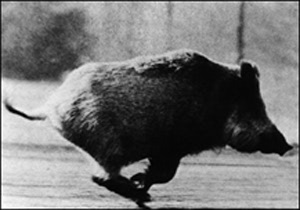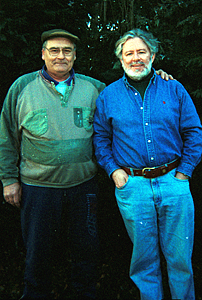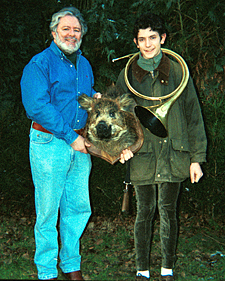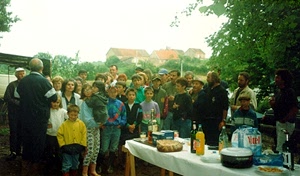|
|
| EATING THE WILD BOAR |
If I'd confessed to jogging nude on the Avenue des Champs-Elysées, I don't think I would have caused the same dismay among my friends as when I admitted that I'd never eaten wild boar. Jogging on the Champs à poil could be dismissed as a quirk, a passing aberration--who cares about nudity in France, anyway?
But never tasted wild boar?
As the French saw it, this constituted a major culinary failing on my part. But it went further than that. Wild boar enjoys a mythic status in France. As the ancestor of the domesticated pig, it has been a major food source and the chief game animal of the country for over a thousand years. And because the boar will attack if threatened, there is an element of danger to every hunt. Hunting the wild boar is a rite of passage for many Frenchmen. |
 |
| The wild boar enjoys a mythic status in France. |
Except for a raised eyebrow, a quietly spoken "Vraiment? (Really?)," no one chided me or said anything discourteous about my failure on the wild boar front. But I could see that a serious reappraisal was going on in their minds.
After all, I was the American who loved escargots, who always ate at least a hundred and twenty oysters between Christmas and New Year's, who enjoyed the subtle delights of a well-truffled foie gras.
The French of my village had not begun to think of me as one of them, but they had granted me a tentative dispensation as an American.
Max, unlike my other French friends, did not react quietly when he heard. But that wasn't entirely unexpected: Max is not the quiet-reaction type.
"C'est pas vrai!" Max exploded, examining me closely to see if I was putting him on. "Never eaten sanglier?"
When I confirmed that I hadn't, Max cupped his hand and kissed the tips of his fingers, his way of saying that I was headed for a three-star dining experience. "We'll fix that soon enough."
Actually, I wasn't sure that I wanted Max to fix it.
For some years before we moved to Panou's village, we had kept a country house in the Loiret, a 90-minute drive south of Paris, mainly for weekends and vacations, although I also used it as a writing hideaway.
The stone house, with its walled-in garden, sat on the outskirts of a village of three hundred souls and faced the open countryside--fields of wheat, rye, corn, sunflower, broken by small woodlands. Each morning when I took my walk, I passed a large fenced-in compound of scraggly brush and saplings that served as a holding pen for boar and their offspring, which were hand-fed until they reached maturity. At a certain age, the sangliers were turned loose in the nearby woods for the sporting pleasure of hunters from Paris.
I was disgusted. What could be more unsporting than to shoot a domesticated boar, the fiercely independent ancestor of our modern pig. To add to my disgust, cage-raised pheasants that could barely fly a few feet off the ground were also released for the hunters. |
 |
My friend Max (left) is not the quiet-reaction type.
He set out to initiate me into the French rite of the wild boar.
|
Moreover, the game and fowl that existed naturally in my neighborhood--plenty of rabbit and partridge--were nearly annihilated by the end of the hunting season.
I came to detest Sundays from September 20 to February 28; Sunday is the big hunting day in France. In my youth, I'd once done some hunting myself--deer, quail, duck, and rabbit. I got my first 12-gauge pump at the age of fifteen. But as I grew older and saw my share of war and turmoil, I grew less enamored of the idea of killing anything.
The hunters who arrived from Paris every Sunday morning, to begin shooting at eight a.m. on the dot, pushed me over the line. Their fancy cars, the designer hunting duds, the silver-plated shotguns told me they had no respect for the rural traditions of hunting. They saw it only as a status symbol, the macho ideal of office workers.
Besides, they scared me.
Often standing shoulder to shoulder, they fired at anything that moved. I was afraid to let my cat and dog out of the house.
As Sunday afternoon wore on, I would dart outside and peer at the roadside near the big chestnut tree where they parked their Citroëns and BMWs, cheering when I saw them leave.
There is a growing controversy over hunting in France, and the French are choosing sides. Unlike in the United States, this has nothing to do with gun control. Guns are highly regulated in France, and even shotguns that hold over two shells must be registered. To the French, the idea that Americans would drive around with pistols and rifles in their cars seems criminally absurd.
So it's not about guns, it has more to do with the feeling that too many hunters have too little respect for the land and the traditions of conservation. From the beginning, therefore, I was skeptical about Max's insistence that I be initiated into the French rite of the wild boar. And I set some stringent conditions.
First, I wanted to make sure that the boar in question was indeed wild and not some pen-raised animal with dull instincts, which had been turned loose for the pleasure of urban hunters. Then there was the hunter himself. Was he dedicated to the traditions of hunting?
Max gamely accepted my conditions, and kissed his fingers again, this time twice. It was going to be a real dining experience, he assured me.
In fact, I soon forgot about it. Every several months or so, Max would send me a bulletin: he was working on the wild boar, I should not become discouraged. The hunting season came and went. No boar. I figured it was another one of Max's enthusiasms that had flared and died like a Roman candle.
A year and a half passed. Then one day Max sped into the yard in his white panel truck and slid to a halt. I could see that even his Irish setter, Horace, was excited.
"Sunday is the day!" Max shouted. "It's already marinating."
"What?"
"Julien's boar."
"Julien?"
"Julien is the son of a friend of mine," Max explained. "He's seventeen-years-old and studying to be a chef. He just got his first boar."
Still a little skeptical, I asked to meet Julien, and Max agreed to set it up.
"You'll see," Max said. "He's a real hunter."
And he was. Julien was a descendant of a family that had been hunting for hundreds of years. He was shy and soft-spoken, but confident when it came to talking about hunting and cooking. I liked him immediately. |
Julien was in his last year of high school. He was in a class of thirty-one students, boys and girls, who were studying to be chefs, one of the many courses the school offered. The school had an attached restaurant.
Two or three days a week, the students put away their math and history books from their regular classes, and went to the restaurant, where they practiced the art of cuisine. People from the nearby village dropped by at lunchtime for a free meal. At the end of the course, Julien would be graded on how well he prepared a full-fledged dinner.
He planned to build his meal around a rack of pork, his favorite dish, not far removed from boar. |
If he passed (and I had no doubt that he would), he would be given a degree as a chef.
After graduating, he hoped to join his older sister in Switzerland at the restaurant where she worked.
Julien had begun his hunting career at the age of seven, when he started to accompany his father to the woods, tagging behind and learning the rules of safety. At sixteen, he applied for a provisional license that allowed him to hunt with a shotgun but only if supervised by his dad. To get the license, he had to first attend a government-taught class on hunting with thirty other applicants, who were required to take a rigorous examination at the end of the course. Only four of the thirty, besides Julien, passed. At the age of eighteen, he could apply for a regular license, which costs around $125.
Julien and his dad were members of a hunting club with 150 members. The elected president of the club decided each weekend which game the club would hunt--rabbit, fox, deer, boar, or roebuck. Since a farmer was anxious to thin the boars that lived near his corn fields, on this morning the hunt president made an easy choice.
It's an undisputed fact that some parts of rural France are being overrun by the wild boar right now. The boar population has gotten so out of hand that 14 of France's 44 departments have petitioned the national government to do something about the problem. The boars emerge from the woods at night, ravage the farmers' crops, and return before dawn to their haven.
At eight o'clock on this morning, Julien went to his assigned post on the hunting line, which was spaced 150 meters from the positions on either side of him. He carried a double-barreled 16-gauge shotgun that had been passed down from his great-grandfather.
As it turned out, it was Julien's own dad who was picked to start the hunt by taking his 13 beagles to the edge of the woods and then heading the dogs toward the hunting line, to drive any boars in front of them. The hunters were only allowed to fire after the boars passed their posts, going in the opposite direction, so as not to risk the possibility of shooting the dogs or their drivers.
"I had been waiting for maybe six hours," Julien said. "Then I heard four blasts of the horn, signaling that boars were moving toward my position. I was excited and scared at the same time. I heard them, a bunch of them, coming right at me. I let them pass and then fired."
It was a clean kill. Under club rules, Julien was awarded the head as a trophy and a leg and shoulder which Max, an accomplished chef, prepared for a Sunday feast at my house.
On the much anticipated day, Max brought a white Monbazillac, one of his favorite wines, and we started with shrimp fried in batter and encircled with bacon. Then Max, with great ceremony, brought out the platter of boar. The platter was decorated with six baked apples. The sliced meat was dark, as opposed to the light color of pork. With it went cepe mushrooms, dauphin potatoes, a confiture of quince, and a sauce derived from the marinade and cooked for seven hours. A red Bordeaux was opened, and we began.
When a meal has been built up with such fanfare--in this case for a year and a half--one often experiences a crashing letdown. The reality is just not as good as the imagination has prepared it to be.
Everyone began to eat, not speaking, intently focused with that peculiar French concentration which is applied to a special meal. Five minutes later, I still had not said anything. |
 |
| With Julien and his trophy. Four blasts of the horn signals the approach of the wild boar. |
Max could stand it no longer. "Et alors?" he asked, pointing his fork at me.
I looked at him solemnly. He knew I would not lie. That was our deal: the truth, however unwanted.
I let a moment pass, and another.
Then I cupped my hand and nosily kissed the tips of my fingers.
Max exploded with laughter.
I had passed the test. |
| RECIPE TWO |
It is unlikely that most people will come across wild boar. I wouldn't even recommend the boar served in French restaurants, because everyone to whom I've talked says it is not the same as the game served up by hunters themselves. Still, if you want to get an idea of how boar tastes, you can substitute a roast of pork and use Max's marinade. Boar is most always marinated for the double reason of tenderization and flavor.
Cooking Pot
The marinade should be placed in a non-metallic pot, either enamel or earthenware. |
Ingredients
Pour in a bottle of wine, either red or white, depending upon your preferences. If this were real boar, we would add a glass of Armagnac or Cognac. But since you are using pork, you can skip this step as you wish.
Add a cup of olive oil. Then ten juniper berries, four cloves of cloves (from the clove tree), ten gains of unmilled pepper, two sprigs of thyme, one laurel leaf, and 15 grams of salt.
Mix everything together in the smallest pot possible which will accommodate the pork, because we want the pork to be well covered with the marinade. Now wipe the pork with a clean damp cloth. Then put it in the pot and cover, and place in the fridge. Turn the pork around in the marinade at least two or three times a day for two to three days.
Then take the pork out, drain, and dry it. Put a little oil and a little butter in a big casserole. Put in the pork and heat at medium on a burner, turning the meat until it is golden on every side. Be careful not to burn the pork.
When the pork is golden, remove from heat and pour out the grease. Do not remove what is left which is stuck to the bottom of the casserole. Add five or six onions and one shallot.
Strain the marinade that is in the other pot. Now add one half cup of the strained marinade to the casserole with the onions. Put in the pork. Fiddle with the heat so that the marinade does not boil as you are cooking. When the marinade evaporates, add another half cup. Turn the pork. Continue adding marinade, half cup by half cup as it evaporates, during a cooking time between one hour and ninety minutes, depending upon the size of the pork roast. When it is done, remove from heat and prepare for serving.
Max's Hunters' Sauce
Put the remaining strained marinade in a separate pot. Bring it to a slow boil. Continue to boil until the volume is reduced by half.
In another casserole add 50 grams of butter and let it melt slowly under a low heat. When the butter is not quite liquid, add a heaping teaspoon of flour to the butter, and mix it well until it is creamy.
Then pour the flour/butter mixture delicately into the reduced marinade, mixing it by small amounts. This will thicken the sauce. In the pot where you originally heated the pork until it was golden, add a little boiling water to de-grease the bottom and then add that to the sauce. Place the onions and shallot near the meat when serving.
 |
| After the hunting season ends, Julien's club gathers for a
"pique-nique." |
|
Next Letter: Wife of a Country Doctor
Previous Letter: The Beginning: A Funeral |
| |
|
|
| ©Copyright 2010, 2009, 2008, Pythia Press. All rights reserved. |
|